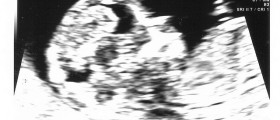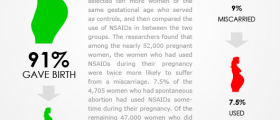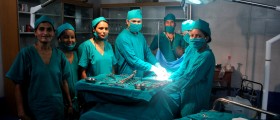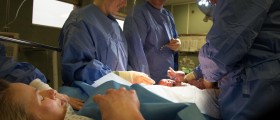
Miscarriage is usually defined as spontaneous ending of the pregnancy earlier than the baby is 20 to 22 weeks old. Miscarriage is a quite common condition and many women even experience it before they actually know of the state. In most times when miscarriage occurs, it just happens that the placenta is expelled without the fetus in it.
Causes of miscarriage
Sometimes it is quite impossible to discover what the reason for the occurrence of miscarriage is. In some cases, chromosomal problems of the mother may be responsible for the spontaneous abortion, but the truth is that many types of infections like herpes simplex, rubella and malaria may induce miscarriage as well. Parvovirus B19 and cytomegalovirus are also considered to be dangerous since they may lead to the natural ending of pregnancy.
Moreover, miscarriage may be induced by polycystic ovarian syndrome, systemic lupus erythematosus, diabetes and thyroid disease. Miscarriage can happen due to anomalous anatomy of the uterus, when the uterus is divided into several parts with the tissue bridge, thus making the fertilized egg incapable to implant itself.
Symptoms of miscarriage
There are some symptoms of miscarriage that are also normal during the pregnancy, such as vaginal bleeding and vaginal spotting. However, when this happens, the woman should consult her gynecologist in order to be sure that the pregnancy goes well. If these bleedings start to occur more than it is normal and if they become heavier, particularly in the early pregnancy, then they usually indicate miscarriage.
The sure sign of the spontaneous abortion is when the pregnant woman discovers that she has a vaginal bleeding that contains blood clots and tissues in it. The fetal development problems may be discovered if the woman manages somehow to take the fetal tissue to the doctor. She should place the fetal tissue in some clean container.
The women who experience miscarriage may notice white or pink vaginal discharge, as well as painful contractions that occur every five to twenty minutes. Furthermore, all the symptoms associated with pregnancy will disappear gradually, like morning sickness and breast tenderness, for example. The abdominal cramping does not always happen when miscarriage is in question, but if it appears, it can vary inintensity.
Treatment for miscarriage
In case of the complete abortion, the woman has expelled everything and except for the regular checkups, nothing more is needed. However, if the doctor detects that some part of the placenta has remained, then in such case D&C procedure is performed, in which the remaining parts are removed in order to prevent the possible infections of the uterus.
















Your thoughts on this
Loading...